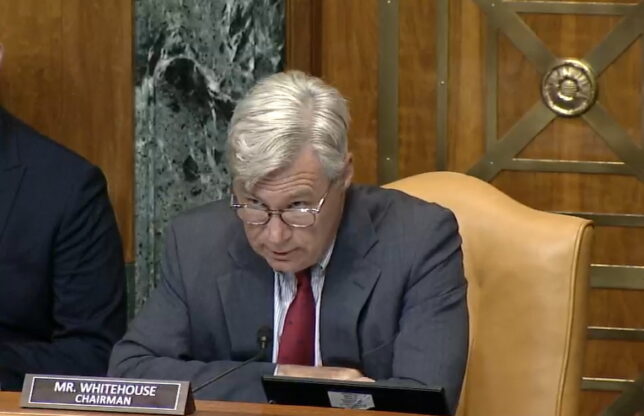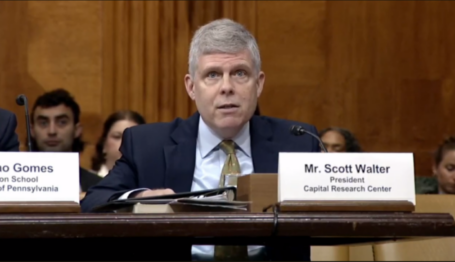Testimony
“Dark Money” in the Climate Debate: DISCLOSE Act
 "Democratic Members of the Committee have avoided any precise legal definition of “dark money,” so let me use the amorphous definition given in an edition of the Party’s Captured Courts reports that was co-authored by Chairman Whitehouse: 'funding for organizations and political activities that cannot be traced to actual donors.'" Credit: U.S. Senate Budget Committee.
"Democratic Members of the Committee have avoided any precise legal definition of “dark money,” so let me use the amorphous definition given in an edition of the Party’s Captured Courts reports that was co-authored by Chairman Whitehouse: 'funding for organizations and political activities that cannot be traced to actual donors.'" Credit: U.S. Senate Budget Committee.

“Dark Money” in the Climate Debate: Questions for the Record (full series)
DISCLOSE Act | “Dark Money” Links
“Cherry-Picked” Data
See also: Senate testimony
Questions for the Record
From Ranking Member Sen. Chuck Grassley
To Mr. Scott Walter
“Dollars and Degrees: Investigating Fossil Fuel Dark Money’s
Systemic Threats to Climate and the Federal Budget”
June 22, 2023
Senate Budget Committee
Question #1: DISCLOSE Act
Senator Kaine mentioned that he doesn’t believe that the problem of dark money is more significant on the Democratic side than the Republican side. Without citing any dollar figures to support this false belief, he rationalized it by touting complete Democratic support for Chairman Whitehouse’s DISCLOSE Act. Are you supportive of this bill and what are the dangers of passing a bill, such as this?
According to the hearing transcript, Sen. [Tim] Kaine [D-VA] said,
… the other point I wanted to make was with respect to something that Mr. Walter said in his testimony because I don’t want anybody watching this to be confused or disinformed. You used a phrase that said the Left wants to silence speech it doesn’t like. We’re talking about disclosure. We’re not talking about silencing anyone.
Sen. Kaine added,
I’ll go back to what my colleague, Senator Merkley, was saying. I don’t believe for an instant that if you added up the total of dark money it’s a more significant problem on the Democratic side than the Republican side because all Democrats are very wanting to get rid of dark money because all Democrats support the Disclose Act….
I leave aside the obvious logical fallacy that, if Members of the Democratic Party support the DISCLOSE Act, the Party therefore does not have more “dark money” support than the other party. But one can’t help noticing that the current Democratically controlled Senate has failed to pass the DISCLOSE Act. As for the documented fact that the Democratic Party dominates its opponents in “dark money,” I gave the sources of my claims in my written testimony—the New York Times, CNN, and Open Secrets—and comment further on this fact in Question 3, below, where I note that one of the Majority’s witnesses impugned my assertion of this fact, with help from a left-wing journalist, thereby spreading disinformation about this climate hearing almost as soon as it was over.
At the hearing I found it ironic to listen to Sen. Kaine claiming he doesn’t wish to silence anyone while I sat in silence at the hearing—neither he nor any other Democratic Member asked questions of me. But the dangers of the DISCLOSE Act are worse than irony. If Sen. Kaine had deigned to ask me about it, I would have explained that he needs to target first, not me, but the NAACP, because that civil rights group not only brought the landmark Supreme Court case that remains the leading constitutional law case establishing donors’ right not to be disclosed, and to this day the NAACP refuses to join Sens. Kaine and Whitehouse’s efforts to violate those rights. So does the American Civil Liberties Union and the Human Rights Campaign, the nation’s largest LGBT rights organization. In fact, these left-leaning groups joined nonprofits supported by Charles Koch—despite all their many policy differences—in a recent lawsuit to protect these rights.
In Questions for the Record[1] stemming from a previous hearing on “dark money” where I had the honor to testify before Chairman [Sheldon] Whitehouse [D-RI], I explained why the threat of government-coerced donor disclosure was not simply a problem back in Jim Crow–era Alabama, when the NAACP launched its famous defensive lawsuit:
… in addition to the traditional moral reasons for avoiding disclosure of donations, “The practical reason for opposing disclosure arises from the very real threats, felt across the political spectrum, of mob harassment and worse. And Mr. Chairman, just as your side has more groups, active for more years, and possessed of far more ‘dark money,’ so does your side have more mobs.”
This question cites [Center for Media & Democracy Lisa] Graves’ assertion that conservatives should support forced donor disclosure, because conservatives have less “dark money.” At the hearing, Mr. Jealous made the same argument. The only possible logical inference is that forced donor disclosure harms the citizens and groups forced to disclose; therefore, conservatives should support laws that will harm their opponents more than themselves.
This question reveals the central disagreement between the party of forced government disclosure, including Sen. Whitehouse, Ms. Graves, and Mr. Jealous, and the party of citizens’ privacy, which I support: I do not wish to harm donors and groups I disagree with, and I respectfully urge you to end your campaign to harm donors and groups you disagree with.
The only thing to add, In support of my argument that the “dark money” bogeyman is used to silence unwanted speech, is that later in the hearing, Sen. Kaine effectively silenced the NAACP when he said,
I don’t think you can analogize NAACP members in the Alabama of the 1950s and their need for protection from criminal prosecution to wealthy individuals who want to support often untrue political ads without their name being associated with those untruths.
Obviously, the NAACP’s actual members, today, do not agree with this claim. They disagree with it so strongly, as I noted, that they are willing to unite with nonprofits with whom they otherwise disagree, and which are supported by the fossil-fuel-rich Koch Industries, to fight against the forced-disclosure policies supported by Sens. Kaine and Whitehouse.
Sen. Kaine is correct that many political ads are less than fully truthful, and all sane Americans recognize this. But the remedy is not to intimidate donors and silence speech. It is to have vigorous public debate. Would that more Members of this Committee were willing to engage in such debate in their hearings.
In the next answer, Democratic witnesses have extensive links to “the web liberal dark money donations.”
[1] Scott Walter, “Highlights from Scott Walter’s Answers to Questions for the Record from Sen. Whitehouse,” Capital Research Center, April 15, 2021, https://capitalresearch.org/article/highlights-from-scott-walters-answers-to-questions-for-the-record-from-sen-whitehouse/.

